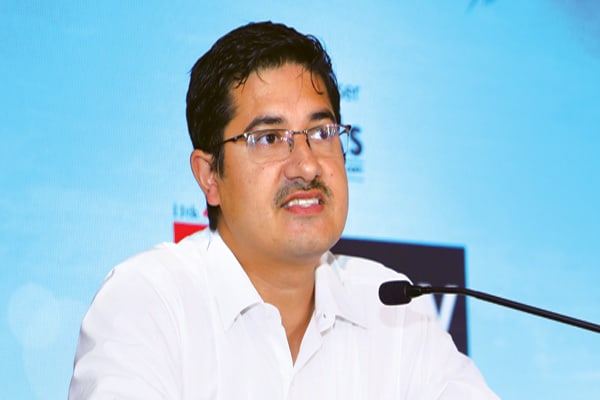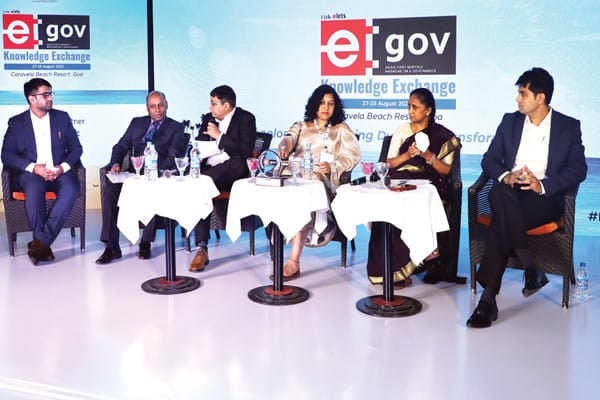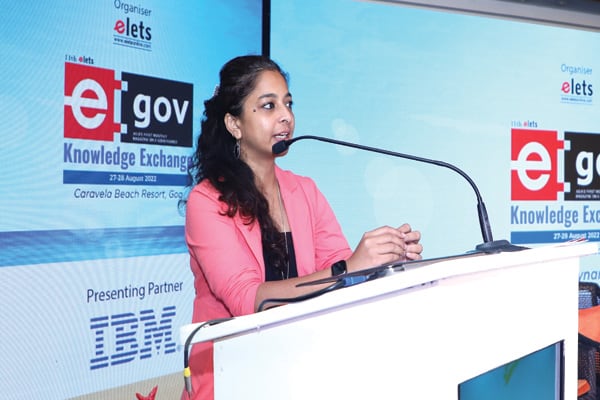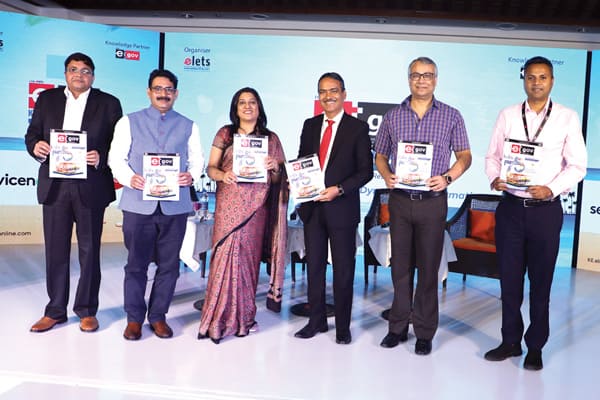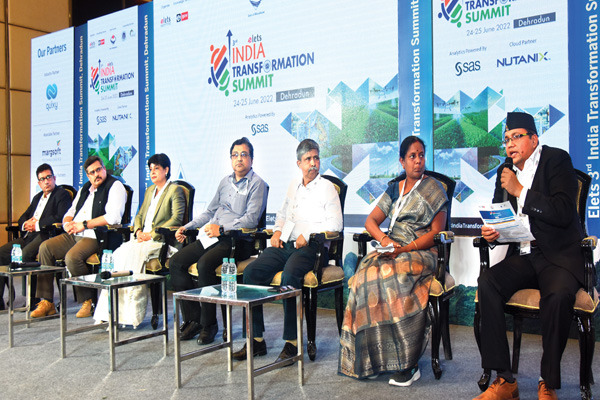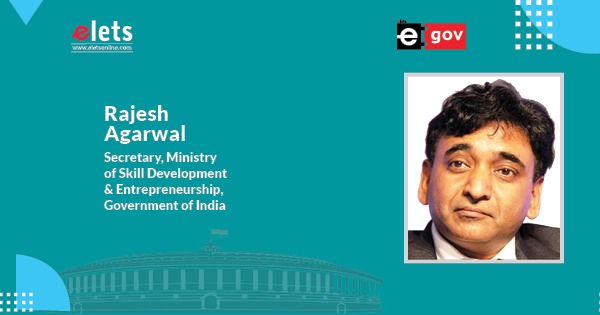
Elets Technomedia along with Karnataka Rural Development and Panchayat Raj (RDPR) Department as ‘Host Partner’ organised ‘Elets National Rural eGovernance Summit 2023’ on 15 March 2023 at The Lalit Ashok Bangalore.
The one-day conference provided a discourse on building a resilient and vibrant rural ecosystem in today’s digital age. It also served as a knowledge-sharing platform for key stakeholders on several groundbreaking initiatives and best practices from across the country for rural empowerment and last-mile inclusion.
Discovering the theme of “Building a vibrant rural ecosystem in the digital age ”, the event featured keynote speeches, panel discussions, and presentations by eminent speakers who shared their knowledge and experiences on various topics related to the industry.

Opening Note
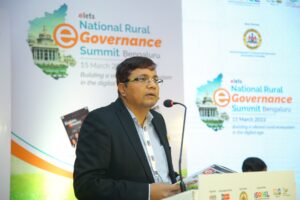

Dr. Ravi Gupta, CEO & Founder, Elets Technomedia commenced the summit by delivering a welcome address, wherein he announced that their flagship magazine, eGov, had turned 18 years old. Launched in 2005, eGov was created to promote awareness about the role of IT in the government sector and how technology could improve operational efficiency.
Dr. Gupta noted that the magazine has been successful in highlighting many unheard success stories, policies, and initiatives that are shaping India’s governance sector. He also highlighted the importance of mainstreaming administrative experiences that showcase the progress made in India’s governance sector. The event marked a significant milestone for Elets Technomedia and eGov magazine, as they continue to drive positive change through their advocacy for technology-driven solutions in government.
Inaugural Session: Building a resilient and vibrant rural ecosystem in the digital age
 Subha Kalyan, Director, eGovernance, Rural Development & Panchayat Raj Deptt, Government of Karnataka delivered the context-setting address. Kalyan highlighted the extensive scope of eGovernance, which has been successfully implemented in both urban and rural regions with a widespread impact.
Subha Kalyan, Director, eGovernance, Rural Development & Panchayat Raj Deptt, Government of Karnataka delivered the context-setting address. Kalyan highlighted the extensive scope of eGovernance, which has been successfully implemented in both urban and rural regions with a widespread impact.
She emphasized the vision of transparent and smart governance in India, inspired by Dr APJ Abdul Kalam, the former president of India. The goal is to establish a seamless, secure, and authentic flow of information, eliminating interdepartmental barriers and providing fair and unbiased services to citizens. E-governance, defined as the use of appropriate technologies, is crucial in enhancing governmental relationships internally and externally. It promotes the democratic expression of human dignity and autonomy, supports economic development, and facilitates the fair and efficient delivery of services to citizens.
Recognising e-governance as a vehicle for initiating and sustaining reforms, the government’s main challenge lies in establishing nationwide technical infrastructure and frameworks, including improved connectivity options. Building institutional capacity and setting standards for high quality and performance, such as interoperability, security, and technical standards, are also critical components of this endeavour.
The Rural Development & Panchayat Raj Department in Karnataka, responsible for nearly 6000-gram panchayats, has implemented various reforms and measures to support gram panchayats and facilitate the effective implementation of rural development programs. At the forefront of adopting e-governance practices, the RDPR department has developed the award-winning Panchatantra application, which has now evolved into Panchatantra 2.0, a dynamic portal. Panchatantra 2.0 aims to enhance the impact and reach of interventions, strengthen gram panchayats’ operations and governance, and promote perspective planning. It enables gram panchayats to formulate comprehensive plans with clearly defined goals and outcomes, using a 12-step participatory planning process. This process involves geotagged focus group discussions and participatory rural appraisals conducted through a mobile application, ensuring inclusive outreach to even the most remote areas.
The citizens can provide feedback on the prepared plan, promoting democratic decision-making at the grassroots level. Another significant initiative is the meeting management module, which streamlines the workflow of all gram panchayat meetings, replacing the traditional paper-based manual process. Digitally generated meeting notices are shared via SMS with a tiny URL, and biometric attendance is captured. Real-time decision points for each agenda item are recorded, and digital proceedings are generated on the same day, minimizing the risk of tampering. These proceedings are also shared via SMS. Furthermore, the government has registered around 1.4 crore rural properties for tax collection, providing citizens with the option to pay through a mobile app. Handheld point-of-sale (POS) machines are also being distributed to gram panchayats.
The summit, organized in collaboration with Elets, has brought together experts from across the country to address critical questions. These questions revolve around the utilization of technology to increase people’s participation, deepen democracy, foster behavioural change and discipline among stakeholders, and facilitate scientific planning, assessment, and monitoring of various schemes. The summit aims to discover additional ways to reach unreached populations and enable the involvement and empowerment of all segments of society through their participation in the government process, thereby bridging social and economic divides.
International Perspective
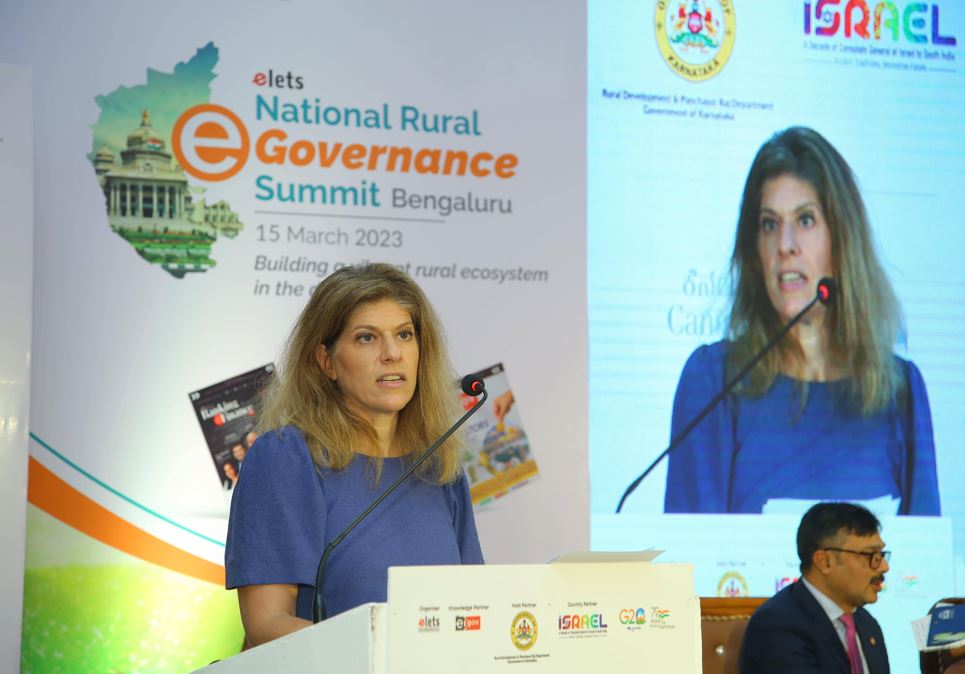
Tammy Ben-Haim, Consul General of Israel to South India shared her international perspective. She emphasized the significance of the India-Israel partnership and considered it an honour to participate alongside representatives from the Panchayati Raj Department, the Union Government, and the Panchayat Department in Karnataka. Ben-Haim highlighted the long-standing collaboration between India and Israel in promoting rural development, spanning over two decades. She noted that this cooperation began with agricultural initiatives and evolved into a strategic partnership at the government level, formalized through a memorandum of understanding signed in 2006.
Ben-Haim, who played a crucial role as the coordinator of Israel, emphasized the enduring nature of their joint efforts, which have yielded tangible benefits for both countries.
Specifically, the Indo-Israel agricultural project focuses on introducing crop diversity, increasing productivity, and optimising water usage efficiency in India. To achieve these goals, the project establishes Centers of Excellence (CoEs) that tailor Israeli agritech and knowledge dissemination to suit local Indian conditions. By adapting methods and technologies, the project aims to significantly enhance farmers’ income, address food security concerns, and ensure the quality and availability of crops.
Currently, 30 fully operational Centers of Excellence are spread across 12 states in India, with an additional 14 under construction in eight more states. In Karnataka alone, Centers of Excellence for Vegetables in Dharwad, pomegranate in Bagalkote, and mango in Kolam, along with two others in Tamil Nadu, serve as exemplary models of the successful cooperation between the two countries. These centres have not only fostered agricultural revenue of over 10 crores rupees through the sale of seeds and grass plants to farmers but also implemented canopy management techniques resulting in increased mango tree yield, reduced incidence of pests and diseases, and improved fruit quality and shelf life.
Furthermore, the project expanded its impact by transferring knowledge and technology to the village level through the Indo-Israel Villages of Excellence initiative. Currently, 150 villages collaborate with 21 Centers of Excellence to implement this relevant technology, which was originally developed in Israel but has since been adapted to suit Indian conditions. Another significant area of cooperation between the two countries lies in the realm of water management, crucial for rural development and the sustenance of both nations. Efforts are focused on reducing water consumption, recycling and reusing brackish and sewage water, and employing desalination techniques, primarily using reverse osmosis. Advanced irrigation and fertigation techniques are also employed to optimize water usage in agriculture.
Israel’s experience in water management, driven by necessity due to its arid climate, has led to significant advancements in this field. India, recognizing the importance of water management, has made substantial strides in adopting these practices. For example, approximately 50% of Israel’s irrigation requirements are met through the use of treated wastewater, and India is following suit by transitioning to more precise irrigation methods and employing water management in over 20% of agricultural irrigation. Notably, there are ongoing projects aimed at utilizing wastewater from urban areas for sustainable agriculture in rural regions, further contributing to water conservation efforts.
Tammy Ben-Haim expressed her satisfaction and pride in the ongoing partnership between India and Israel in rural development, agriculture, and water management. She commended the progress made thus far and conveyed her eagerness to continue fostering cooperation in these crucial areas for the benefit of both countries. Ben-Haim concluded by wishing success for the important conference and expressing her enthusiasm for further growth in the shared objectives of rural development, agriculture, and water management.
Special Address

Dr. Shakil P. Ahammed, Principal Secretary, Water Resources & Home (Police), Government of Meghalaya addressed the topic of water quality management and consumption assessment.
Dr. Shakil P. Ahammed emphasized the need for additional applications and apps in the field of water management. Dr. Ahammed, responsible for Water Resources and the National Water Mission, pointed out the impending challenge of increasing water consumption.
While water demand is expected to rise significantly, the supply remains stagnant or may even decrease. He urged everyone to contemplate the importance of water quality management and water consumption assessment in optimizing water usage, reuse, recycling, and rejuvenation. Dr. Ahammed stressed the significance of leaving the planet with adequate water resources, drawing attention to the abundance of water in his home state of Meghalaya, known as one of the wettest places on Earth.
Despite this abundance, there are still areas within Meghalaya, such as the Khasi Village, where water scarcity is a reality. He called this situation a “paradox of plenty” and emphasized the responsibility of technocrats and those involved in water-related fields to find solutions. Dr. Ahammed acknowledged that water is a shared concern and encouraged collaboration to prevent future generations from suffering due to the depletion of water resources.
He expressed his concern, “Our descendants might accuse us of being greedy and irresponsible if we fail to safeguard water and ensure their access to it.” He concluded by reminding the audience that water is essential for all aspects of life, including forests and development, emphasising the wisdom and harmony with nature exhibited by indigenous and tribal communities. He urged everyone to return to their roots and preserve the planet for future generations.
Keynote Address

L. K. Atheeq, Additional Chief Secretary, Rural Development & Panchayat Raj Dept., Government of Karnataka spoke about the department’s instrumental role in transforming rural governance in the state. He highlighted the department’s development of various effective applications such as Panchatantra, e-Swathu, and Gandhi Sakshi Kayaka, which have helped to reimagine rural governance. Atheeq emphasised that any technological solution requires modern upgrading, which poses a significant challenge from a chain management point of view. He noted that Karnataka has 6250 government entities functioning in rural areas, making it essential to percolate technological solutions down to the ground level to make citizens aware of their rights.
Atheeq’s address offered insights into the critical role of technology in transforming rural governance and highlighted the importance of effective implementation to achieve success. His speech provided valuable perspectives on the challenges of bringing technological solutions to the grassroots level and the need to engage citizens in the process.
Keynote Address
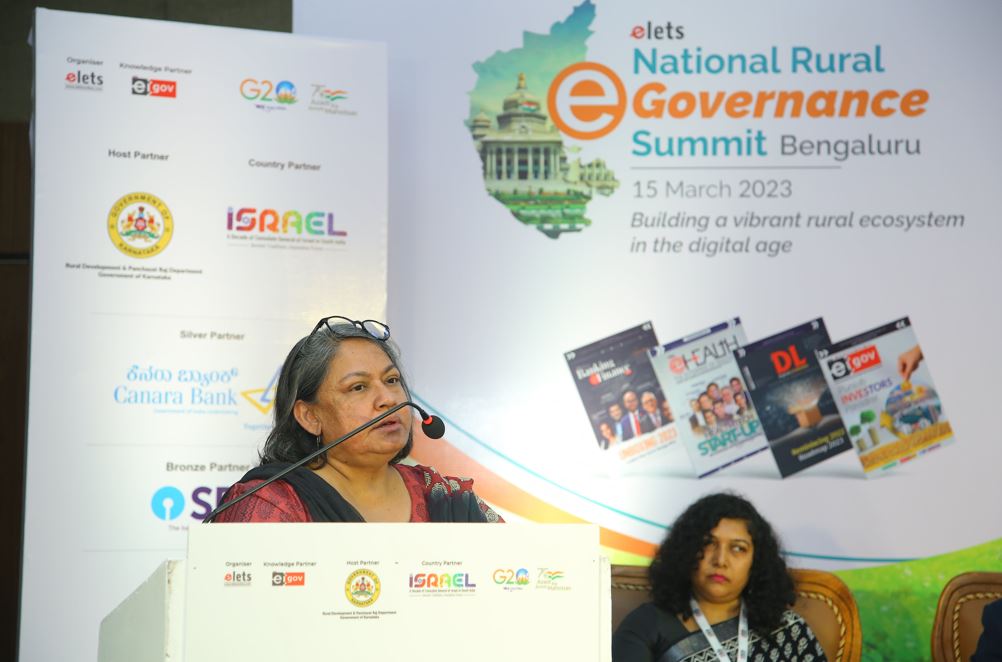 Uma Mahadevan, Additional Chief Secretary, Rural Development & Panchayat Raj Deptt, Government of Karnataka spoke about the challenges of utilising technology to promote equity while enhancing efficiency.
Uma Mahadevan, Additional Chief Secretary, Rural Development & Panchayat Raj Deptt, Government of Karnataka spoke about the challenges of utilising technology to promote equity while enhancing efficiency.
Mahadevan emphasised that while technology provides ample opportunities to increase efficiency, there is a risk that it can lead to centralisation. Working in the field of democratic decentralisation, she stressed the importance of using technology to increase participation and promote deliberation to ensure that equity is also considered while implementing technology.
Mahadevan noted that it is crucial to be careful about the use of technology and business process reengineering, which may assume that reducing steps in a process will lead to efficiency. She highlighted the need to focus on promoting deliberation and careful consideration to ensure that equity is not overlooked.
Mahadevan’s address provided valuable insights into the challenges and opportunities of leveraging technology to promote equity and enhance efficiency. Her emphasis on the importance of deliberation and careful consideration offered valuable perspectives on using technology for democratic decentralisation.
Keynote Address
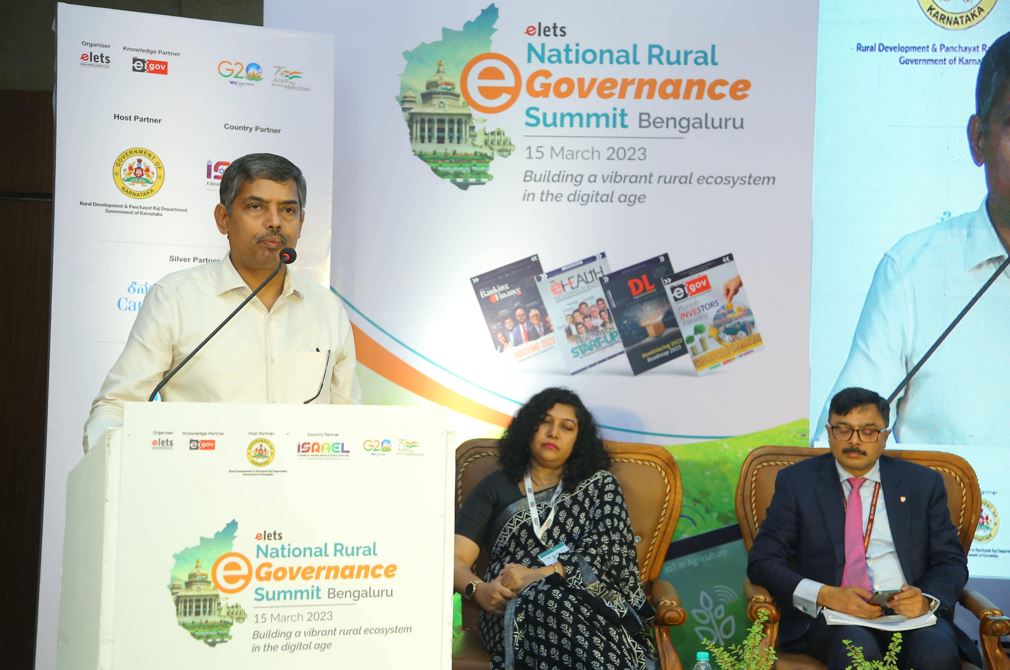 V. Ponnuraj, the Secretary of the Department of Personnel & Administrative Reforms (eGovernance) in the Government of Karnataka, addressed the audience, emphasizing the importance of transforming governance through technology and IT interventions. He highlighted the need to examine how services have been delivered and how governance has operated in the past, as well as how these aspects will evolve in the future. Ponnuraj acknowledged the ever- evolving nature of technology and stressed the importance of adapting to cope with its advancements. He referred to Alvin Toffler’s insights on technology’s impact on human lives, noting its relevance for government and governance in the present day. Ponnuraj emphasized the significance of collaboration between the public and private sectors to collectively transform governance practices.
V. Ponnuraj, the Secretary of the Department of Personnel & Administrative Reforms (eGovernance) in the Government of Karnataka, addressed the audience, emphasizing the importance of transforming governance through technology and IT interventions. He highlighted the need to examine how services have been delivered and how governance has operated in the past, as well as how these aspects will evolve in the future. Ponnuraj acknowledged the ever- evolving nature of technology and stressed the importance of adapting to cope with its advancements. He referred to Alvin Toffler’s insights on technology’s impact on human lives, noting its relevance for government and governance in the present day. Ponnuraj emphasized the significance of collaboration between the public and private sectors to collectively transform governance practices.
In his remarks, Ponnuraj underscored the significance of data in the digital age. He stated that software and platforms alone are insufficient; the real value lies in the data generated by these systems. Ponnuraj stressed the importance of connecting and leveraging this data effectively to achieve synergy and provide better solutions to the people. He shared an example of the challenges faced in rural parts of Karnataka, particularly around Bangalore, regarding the creation of property IDs. Ponnuraj acknowledged the difficulty citizens and administrators encounter in this process, and he expressed the need to leverage technology to make it more user- friendly and efficient.
Ponnuraj acknowledged the challenges ahead and recognised that the sessions organised during the event would partially address these issues. However, he emphasised the importance of continuous transformation to improve the lives of all stakeholders. He emphasised the need to prioritise citizens at every stage of system and process development, ensuring that their experiences and needs remain at the centre of decision-making. Ponnuraj expressed the eagerness of the Department of Personnel & Administrative Reforms to collaborate with the Rural Development and Panchayat Raj (RDPR) Department to alleviate the pain points faced by citizens and administrators at various levels of governance.
Ponnuraj highlighted the commitment to making the lives of all stakeholders easier and smoother. He recognised the importance of addressing the challenges faced by citizens and administrators and expressed his department’s willingness to work alongside the RDPR Department to overcome these challenges and improve the overall governance experience.
Keynote Address

Dr. Manoj Rajan, Commissioner, Karnataka State Disaster Management Authority – Special presentation: Use of geospatial technologies in disaster management
Dr Manoj Rajan, Commissioner of the Karnataka State Disaster Management Authority, delivered a special presentation on the use of geospatial technologies in disaster management. He acknowledged the challenges faced in bridging the rural-urban digital divide and highlighted the rapid penetration of geospatial technologies in rural areas. He emphasised that geospatial technologies, such as those used by Ola, Uber, and Amazon, have become integral to everyday life, allowing users to communicate their locations and preferences to suppliers.
He also explained that geospatial technology encompasses remote sensing, geographical information systems (GIS), and global positioning systems (GPS). He highlighted the importance of geospatial infrastructure in collecting, storing, analyzing, and disseminating data for effective decision- making. Using examples from Karnataka, he illustrated how geospatial technology enables the collection of weather data, seismic and lightning signatures, and other parameters essential for disaster management. By visualizing this information on geospatial infrastructure, decision-makers can identify drought-prone areas, flood-prone areas, river flow patterns, and hotspots for lightning deaths.
The presentation showcased how geospatial technology has been extensively adopted in Karnataka. Real-time information on weather parameters, such as rainfall, temperature, humidity, wind speed, and direction, is collected from a vast network of monitoring sensors across the state. This data is processed, analyzed, and disseminated through a robust geospatial infrastructure, enabling decision-makers to set alerts, plan water release, and undertake contingency planning. The presentation also demonstrated the geospatial monitoring of lightning strikes and the dissemination of information to stakeholders for effective communication and awareness campaigns.
Dr Rajan emphasized that geospatial technology simplifies disaster management and can be applied to various applications and activities. He showcased a geospatially enabled web portal that provides updated information on weather parameters, detailed reports, and analysis of long-term climate patterns. The portal facilitates structured response and optimized resource utilization by mapping available resources, personnel, buildings, hospitals, vehicles, and rescue equipment. It enables accurate decision-making during emergencies, such as choosing relief camp locations, based on the capacity and facilities of buildings and hospitals.
The presentation further highlighted the implementation of geospatially enabled disaster management plans in five districts of Karnataka. This new system collects real-time information, generates reports, and performs complex analyses to support decision-making. It replaces the traditional paper-based plans, allowing for structured responses, efficient resource allocation, and adherence to standard operating procedures. Templates and mobile applications have been developed to facilitate post-disaster reporting and loss assessment, ensuring transparency, efficiency, and accountability.
Dr Rajan concluded by emphasizing the significant role of geospatial technology in simplifying and enhancing disaster management. He highlighted the use of artificial intelligence and machine learning in processing and analyzing data, such as 72-hour forecasts at the gram panchayat level. The integration of geospatial technologies, data collection systems, and intelligent decision-support systems has enabled efficient communication, timely response, and livelihood-related information dissemination, supporting farmers and rural communities in Karnataka.
Special Presentation: Jal Sanjeevani
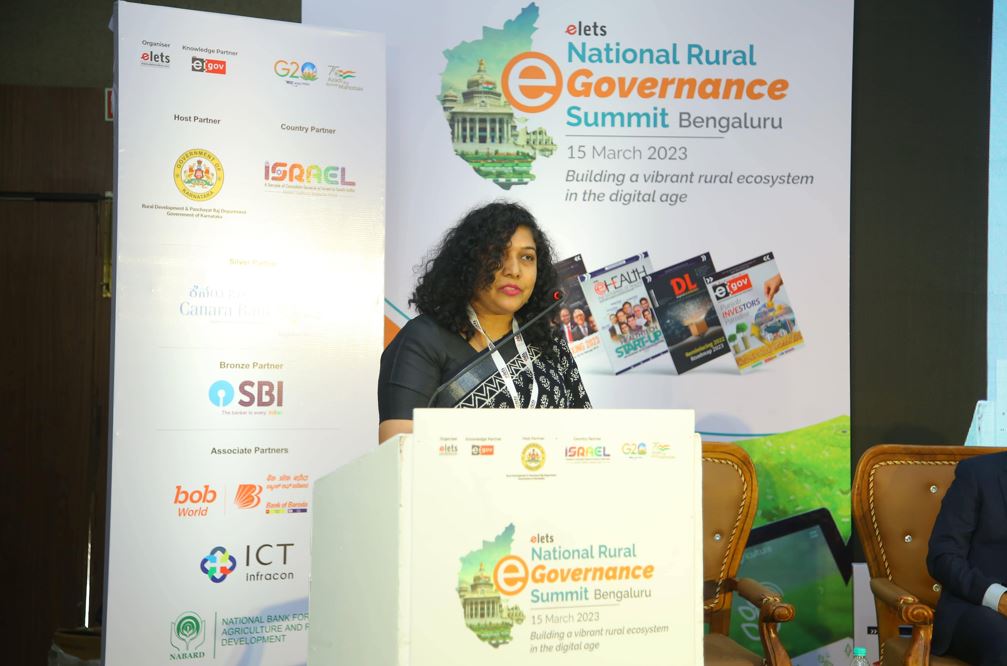 Shilpa Nag, Commissioner of Rural Development in the Rural Development & Panchayat Raj Department of the Government of Karnataka, delivered a special presentation on Jal Sanjeevani. She began by acknowledging their participation in various e-government summits across the country and highlighted two unique aspects of their approach. Firstly, she emphasised the comprehensive nature of planning, which is a departure from the usual focus on implementation, monitoring, vigilance, and evaluation of Citizen Services platforms.
Shilpa Nag, Commissioner of Rural Development in the Rural Development & Panchayat Raj Department of the Government of Karnataka, delivered a special presentation on Jal Sanjeevani. She began by acknowledging their participation in various e-government summits across the country and highlighted two unique aspects of their approach. Firstly, she emphasised the comprehensive nature of planning, which is a departure from the usual focus on implementation, monitoring, vigilance, and evaluation of Citizen Services platforms.
Secondly, she emphasised the significance of Geographic Information Systems (GIS) and other remote sensing technologies, which are often overlooked. She introduced the audience to the concept of GIS and its application in disaster management. Karnataka was acknowledged as a leading player in GIS technologies in the country. For the first time, they were extensively utilizing GIS in Karnataka for planning purposes. As the Commissioner of Rural Development, Shilpa Nag oversaw the implementation of the Narega (Mahatma Gandhi National Employment Guarantee Scheme) at the state level. which has been neglected so far. Her presentation focused on the planning aspect of Narega and how technology platforms and GIS information were leveraged in this process. The Jal Sanjeevani initiative is a step towards addressing this issue.
Assuming the audience’s familiarity with Narega as the largest employment guarantee scheme globally, Shilpa Nag proceeded to provide further details. In the current Union budget, an allocation of 60,000 crores was made for Narega expenditure. Karnataka stood out as one of the leading implementers of Narega, covering diverse areas such as natural resource management and non-NRM assets like school and road infrastructure. The scheme generated between 13 crore person-days to 16 crore person-days. However, Shilpa Nag aimed to shift the perspective from solely viewing Narega as a means of employment generation, particularly during lean agricultural seasons.
In rural areas of Karnataka and throughout the state, manual unskilled labour prevailed, with a wage rate of 3.9 rupees per day. Nevertheless, she highlighted that Narega encompassed much more than providing employment. The focus was on recognizing the natural resource management assets created by Narega. Mandated works under Narega required 65% to be dedicated to soil and water conservation. Shilpa Nag emphasized that the impact and contribution of Narega to ecology, environment, and climate change mitigation were often underrepresented. Her presentation aimed to shed light on this aspect.
Water conservation was highlighted as crucial for economic growth and human survival, aligning with Shakil’s perspective. Shilpa Nag further emphasized the importance of intergenerational equity, considering the well-being of future generations when utilizing resources. Narega played a significant role in water and soil conservation, offering substantial benefits at a minimal cost. Scientific planning had the potential to rejuvenate extensive land and water areas, acting as a preventive measure against drought. Shilpa Nag emphasized the need to approach Narega, and any other scheme, not only from a post-disaster perspective but also with a focus on climate resilience.
Special Presentation: Panchtantra 2.0
The eGovernance revolution has been making waves across various domains, from urban to rural regions, and its impact has been widespread. The Director of eGovernance, Rural Development & Panchayat Raj Dept. of the Government of Karnataka, Subha Kalyan, shared insights on the current scope and importance of eGovernance. The government now views eGovernance as a crucial tool to initiate and sustain reforms, particularly in three key areas: public services, management, and government.
The event shed light on how eGovernance has become an integral part of numerous sectors, paving the way for a more efficient and effective governance system.
Panel Discussion: Leveraging GIS technologies & geospatial tools for effective project planning, assessment, monitoring and implementation
The panel discussion on leveraging GIS technologies and geospatial tools for effective project planning, assessment, monitoring, and implementation was held, with Shilpa Nag, Commissioner of Rural Development, Rural Development & Panchayat Raj Dept., Government of Karnataka as the session chair.
Jincy Roy, CEO of the Water and Sanitation Management Organization (WASMO), Government of Gujarat, shared her thoughts on how GIS and remote sensing technology can help in better prediction and monitoring of water resources.
Nizamudeen A., Director of Kerala State Remote Sensing and Environment Centre (KSREC), highlighted how technology adoption can be streamlined with the vision of decision-makers and the target audience for effective results.
Dr. C. R. Bannur, GIS Expert & Advisor, Karnataka State Remote Sensing Applications Centre, discussed how geospatial technology can now be applied to rural development to create an accurate representation of the current situation on the ground and establish an operational picture for monitoring.
Key Takeaways of the Session
- Emphasizing the importance of utilizing GIS technologies and geospatial tools in project management. Highlighted the role of GIS and remote sensing technology in predicting and monitoring water resources, enabling better water management.
- Emphasizing the need to align technology adoption with the vision of decision-makers and the target audience to achieve effective outcomes.
- Discussing the application of geospatial technology in rural development, enabling accurate representation and operational monitoring of ground-level situations.
- The session underscored the significance of integrating GIS technologies and geospatial tools into project planning, assessment, monitoring, and implementation processes for improved efficiency and outcomes.
Panel Discussion: Technologies for fostering innovations in eGovernance
The use of technology for fostering innovations in eGovernance was the topic of discussion at a recent panel event, chaired by P.I. Sreevidya, Chief Executive Officer of Centre for eGovernance, Dept of Personnel & Administrative Reforms (DPAR), Govt of Karnataka. The panelists shared their experiences in implementing various eGovernance initiatives and their impact.
Samartharam N.R., Senior Director (IT), NIC Karnataka State Unit, emphasized the importance of Digital Public Infrastructure (DPI) for the smooth functioning of economies and the well- being of citizens. He explained how DPI encompasses digital solutions that facilitate essential functions for the delivery of public and private services, including collaboration, commerce, and governance.
T. Ramesh, Chief General Manager of the National Bank for Agriculture and Rural Development (NABARD), spoke about their technological innovations, which expanded from a simple refinancing agency to a colossal institution. He also explained how NABARD provides not only refinancing to banks but also financing to the government for infrastructure development, which is one of their primary funding areas.
Debananda Sahoo, Chief General Manager of Canara Bank, shared their efforts in pushing further the ongoing financial inclusion in the country. Canara Bank is an SLBC convenor bank with more than 1000 branches functioning in rural and semi-urban areas in Karnataka. They have also kept a large number of banking correspondents in the state to lead the digitalization of Self Help Groups (SHGs) in Karnataka.
Dileesh Sasi, Director of Electronic Delivery of Citizen Services (EDCS) eGovernance Department, Government of Karnataka, highlighted the significance of their online platform, ‘SEVA SINDHU,’ which provides a single platform for citizens to access a wide range of services from both the state and central government. He also explained their assistant mode of service delivery through the Bangalore One Centre and Karnataka One Center for major cities and urban local bodies in Karnataka, ensuring comprehensive coverage of the service delivery spectrum.
Samuel Imbadurai, Additional Director of Rural Development and Panchayat Raj Dept., Government of Tamil Nadu, shared Tamil Nadu’s experience in leveraging ICT technologies for the past twenty years to transform rural governance in the state. He explained how they are using app- based and web-based technologies to reimagine and transform rural eGovernance, with an 80% penetration of mobile phones in the rural landscape of Tamil Nadu making the eGovernance process more efficient and citizen-friendly. The event showcased how technological innovations in eGovernance have been transforming governance in the country and the impact of these initiatives on the citizens.
Key Takeaways of the session
- The panel discussion focused on the use of technology in driving innovations in eGovernance.
- The session highlighted the significance of the online platform ‘SEVA SINDHU’ that provides a comprehensive range of services to citizens from both state and central government.
- The discussion explored various eGovernance initiatives and their impact. The session emphasized the importance of Digital Public Infrastructure (DPI) for enabling efficient public and private service delivery.
- Discussed the technological innovations and their role in financing infrastructure development.
- The discussion highlighted the efforts in advancing financial inclusion and digitization of Self Help Groups (SHGs) in Karnataka.
- Highlighted Tamil Nadu’s use of ICT technologies to enhance rural governance and the high mobile phone penetration rate contributing to efficient eGovernance processes.
- The panel discussion demonstrated how technological innovations in eGovernance are transforming governance practices across the country and benefiting citizens.
Panel Discussion: Applications of eGovernance in Rural Livelihood
The panel discussion was held on the topic of “Applications of eGovernance in Rural Livelihood”. The session was chaired by Ragapriya R., Mission Director of Karnataka State Rural Livelihood Mission, and attended by prominent speakers from various organizations.
Krishna Baruah, State Mission Director of Assam State Rural Livelihoods Mission Society, spoke about the mission’s efforts to empower rural women Self Help Groups (SHGs) with capacity building, credit linkage, and market support. ASRLM has been playing an instrumental role in enhancing the social and economic empowerment of the rural poor of Assam since its inception in 2011.
Fouzia Taranum, Controller of Examinations for the Government of Karnataka, emphasized the importance of integrating and utilizing eGovernance effectively for the economic empowerment of women’s SHGs. She highlighted the need to bridge the gender digital divide and transform digital literacy into a means of generating income.
Sandeep Ubale, Chief General Manager of Digi & eCommerce for the State Bank of India, discussed the SHG initiative’s importance in promoting collective responsibility rather than individual responsibility, making it a crucial driver of the rural economy. He also noted that the process of credit linkages and welfare schemes had become mechanized with the growth of SHG groups and the introduction of new schemes.
Ganesh Prasad, Senior Fellow of the MS Swaminathan Research Foundation, spoke about Karnataka’s efforts to collect rich data from the grassroots level, including the preparation of a human development index at the village and gram panchayat level. He also highlighted the socioeconomic deprivation index, which will be useful in preparing Village Poverty Reduction Plans (VPRP) and the instrumental role played by SHGs in collecting these data.
Key Highlights of the Session
- The panel discussion provided valuable insights into the applications of eGovernance in rural livelihoods
- Emphasized the importance of empowering women’s SHGs to bridge the gender digital divide and promote rural economic development.
- The event ended with the Vote of thanks of Krishna C. Mishra, Product Head-Special Projects, Elets Technomedia Pvt. Ltd.
Highlights from the Summit
The purpose of this summit?
The aim of this single-day conference was to facilitate discussions on establishing a strong and dynamic rural ecosystem in the modern era of technology. Additionally, it acted as a platform for sharing knowledge among important individuals and groups involved in pioneering initiatives and exemplary approaches nationwide, focusing on empowering rural areas and ensuring inclusivity at the grassroots level.
Who were the attendees?
Top policy-makers, experts, and decision-makers from the industry and the government participated in the discussions, including:
- Shilpa Nag, Commissioner, Rural Development, Rural Development & Panchayat Raj Deptt, Government of Karnataka
- Subha Kalyan, Director, eGovernance, Rural Development & Panchayat Raj Deptt, Government of Karnataka
- Tammy Ben-Haim, Consul General of Israel to South India Special Address:
- Dr. Shakil P. Ahammed, Principal Secretary, Water Resources & Home (Police), Government of Meghalaya
- L. K. Atheeq, Additional Chief Secretary, Rural Development & Panchayat Raj Deptt, Government of Karnataka
- Uma Mahadevan, Additional Chief Secretary, Rural Development & Panchayat Raj Deptt, Government of Karnataka
- V. Ponnuraj, Secretary, Department of Personnel & Administrative Reforms (DPAR) eGovernance, Government of Karnataka
- Dr. Manoj Rajan, Commissioner, Karnataka State Disaster Management Authority
- Jincy Roy, Chief Executive Officer, Water and Sanitation Management Organization (WASMO), Government of Gujarat
- Nizamudeen A., Director, Kerala State Remote Sensing and Environment Centre (KSREC) Dr. C. R. Bannur, GIS Expert & Advisor, Karnataka State Remote Sensing Applications Centre
Featured Departments
The event witnessed a significant number of attendees, including over 20 thought leaders and more than 200 delegates and experts from diverse departments, such as:
- Rural Development & Panchayat Raj Dept
- Water Resources & Home (Police)
- Department of Personnel & Administrative Reforms (DPAR) eGovernance
- Kerala State Remote Sensing and Environment Centre (KSREC)
- Controller of Examinations
- Dept of Personnel & Administrative Reforms (DPAR)
- Electronic Delivery of Citizen Services (EDCS) eGovernance Department
- GIS Expert & Advisor
- Chief General Manager (Digi & eCommerce), State Bank of India
- Assam State Rural Livelihoods Mission Society
- Chief General Manager, Canara Bank
- Chief General Manager, National Bank for Agriculture and Rural Development (NABARD)
Be a part of Elets Collaborative Initiatives. Join Us for Upcoming Events and explore business opportunities. Like us on Facebook , connect with us on LinkedIn and follow us on Twitter, Instagram.



